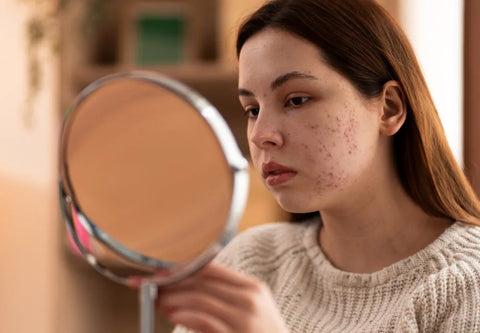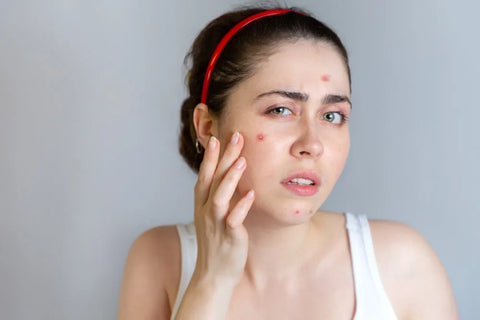دعنا نواجه الأمر - التعامل مع لون البشرة غير المتساوي، والبقع الداكنة، أو علامات حب الشباب العنيدة يمكن أن يكون محبطًا حقًا. هنا يأتي دور فرط التصبغ. إذا كنت قد تساءلت يومًا لماذا تصبح بعض مناطق بشرتك أغمق أو لماذا تترك ندوب حب الشباب وراءها بقع بنية مزعجة، فأنت في المكان الصحيح.
دعنا نتعمق في ما هو فرط التصبغ بالفعل، ولماذا يحدث، وكيف يمكنك علاجه والوقاية منه كالمحترفين.
ما هو الميلانين؟
دور الميلانين في الجلد والشعر والعيون
الميلانين هو الصبغة السحرية وراء لون شعرنا وبشرتنا وعيوننا. إنها طريقة جسمك لحمايتك من الشمس. كلما زاد الميلانين لديك، زادت درجة لون بشرتك - وكلما حصلت على حماية طبيعية أفضل من الشمس.
كيف يتم إنتاج الميلانين بواسطة الخلايا الميلانينية
يتم إنتاج الميلانين بواسطة خلايا جلدية خاصة تسمى الخلايا الميلانينية, التي تعيش في الطبقة السفلية من الطبقة الخارجية للجلد (البشرة). هذه المصانع الصغيرة للصبغة تزيد من إنتاج الميلانين عندما يتم تحفيزها بأشياء مثل ضوء الشمس أو الالتهاب.
ما هي فرط التصبغ؟
التعريف والنظرة العامة
يحدث فرط التصبغ عندما ينتج جسمك الكثير من الميلانين في مناطق معينة. هذا ما يسبب تلك البقع الداكنة أو لون البشرة غير المتساوي. يمكن أن يظهر على شكل نمش، كلف، بقع عمر، أو ندوب من حب الشباب السابق.
فرط التصبغ المنتشر مقابل البؤري
-
منتشر: منتشرة على مناطق أكبر، مثل الكلف على الخدين.
-
بؤري: مركزة في مناطق صغيرة، مثل بقعة داكنة من حب الشباب.
الأسباب الشائعة لفرط التصبغ
التعرض للشمس
هذه واحدة كبيرة. الأشعة فوق البنفسجية تحفز إنتاج الميلانين. اعتبرها نظام الإنذار الطبيعي لبشرتك يقول: "احميني!" لكن هذا يمكن أن يخرج عن السيطرة، مما يترك لك بقع شمسية أو نمش.
التغيرات الهرمونية
يمكن أن تؤدي حالات مثل الحمل أو استخدام حبوب منع الحمل إلى تحفيز الكلف, والمعروفة أيضًا باسم "قناع الحمل."
الوراثة والجينات
بعض الأشخاص معرضون بشكل طبيعي لمشاكل التصبغ. شكرًا، الجينات.
حب الشباب والالتهاب (PIH)
بعد شفاء حب الشباب، غالبًا ما تترك وراءها بقع داكنة. يُعرف هذا بـ فرط التصبغ بعد الالتهاب (PIH).
علاجات البشرة غير الصحيحة أو الفاشلة
يمكن أن تؤدي التقشير السيئ، أو الليزر القاسي، أو منتجات البشرة الخاطئة إلى تهيج بشرتك وتحفيز ظهور بقع داكنة.
فرط التصبغ بعد الالتهاب (PIH)
ما الذي يسبب فرط التصبغ بعد الالتهاب؟
غالبًا ما تكون فرط التصبغ بعد الالتهاب (PIH) نتيجة لـ:
-
تفجرات حب الشباب
-
حروق أو خدوش
-
فرط التقشير
-
ردود الفعل التحسسية
كم من الوقت يستمر فرط التصبغ؟
يختلف الأمر. قد تتلاشى البقع الفاتحة في غضون أسابيع قليلة، بينما يمكن أن تستغرق البقع الأعمق شهورًا - أو أكثر - دون علاج.
الوقاية من فرط التصبغ الناتج عن حب الشباب أو الإصابة
-
لا تعصر أو تفقع البثور.
-
ارتدِ دائمًا واقي الشمس.
-
استخدم منتجات العناية بالبشرة اللطيفة.
كيف يؤثر التعرض للأشعة فوق البنفسجية على إنتاج الميلانين
صلة الشمس بالميلانين
كلما تعرضت للشمس أكثر، كلما حاولت بشرتك إنتاج المزيد من الميلانين لحماية نفسها. وهذا يمكن أن يؤدي إلى تصبغ غير متساوٍ, خاصة في البشرة القديمة أو المتضررة.
لماذا تكون البشرة المتقدمة في السن أكثر عرضة لفرط التصبغ
مع تقدمنا في العمر، تصبح الخلايا الصبغية موزعة بشكل أقل انتظامًا وأصعب في التحكم. وهذا يؤدي إلى المزيد من مشاكل التصبغ مع مرور الوقت.
أنواع اضطرابات فرط التصبغ
الكلف
بقع داكنة ومتقطعة تظهر عادة على الوجه. الهرمونات والتعرض للشمس هما السبب الرئيسي.
اللطخات العمرية (بقع العمر)
بقع بنية مسطحة تظهر مع تقدم العمر، غالبًا على اليدين أو الوجه أو الكتفين.
النمش
لطيفة ولكنها أحيانًا غير مرغوب فيها. النمش وراثي وغالبًا ما يصبح أغمق مع التعرض للشمس.
PIH
البقع الداكنة الناتجة عن الالتهاب، مثل حب الشباب أو الإكزيما.
منتجات تبييض وإشراق البشرة في قطر
هل تعمل منتجات تفتيح البشرة حقًا؟
نعم، إذا كانت تحتوي على المكونات الصحيحة وتستخدم باستمرار وبشكل آمن. هم لا مبيض الجلد؛ بدلاً من ذلك، فإنها توحد لون البشرة من خلال التحكم في إنتاج الميلانين.
الطريقة الصحيحة لاستخدامها
-
اختبر البقعة دائمًا.
-
تابع باستخدام واقي الشمس.
-
لا تفرط في الاستخدام!
المكونات النشطة الرئيسية التي تساعد في فرط التصبغ
ألفا أربوتين
مستخلص من النباتات، يمنع تيروزيناز, إنزيم يشارك في إنتاج الميلانين. رائع لعلاج الكلف وبقع الشمس.
فيتامين سي
هذا المضاد للأكسدة يضيء البشرة، ويعزز الكولاجين، ويساعد في تفتيح البقع الداكنة. بالإضافة إلى ذلك، فإنه يحمي من أضرار الشمس.
لوميسكين
يعمل على توحيد لون البشرة ويمنع البقع الداكنة عن طريق إبطاء إنتاج الميلانين. إنه قابل للذوبان في الزيت، لذا فهو رائع لمنتجات العناية بالبشرة مثل السيروم والكريمات.
مكونات بارزة أخرى: نياسيناميد، حمض كوجيك، إلخ.
-
نياسيناميد: يقلل الالتهاب والبقع الداكنة.
-
حمض كوجيك: يقاتل إنتاج الميلانين.
-
مستخلص جذور العرقسوس: يهدئ ويضيء.
علاجات طبيعية وتعديلات في نمط الحياة
علاجات منزلية للحالات الخفيفة
-
صبار الألوة فيرا
-
أقنعة الكركم
-
مستخلص الشاي الأخضر
أطعمة تحسن لون البشرة بشكل طبيعي
-
التوت (مضادات الأكسدة)
-
الفواكه الحمضية (فيتامين C)
-
الخضروات الورقية (عوامل إزالة السموم)
خيارات العلاج الاحترافية
تقشير كيميائي
يقشر الطبقة العليا من الجلد، كاشفًا عن جلد جديد وأكثر توازنًا تحتها.
علاج بالليزر
يستهدف الميلانين ويكسره باستخدام طاقة الضوء.
المايكرو نيدلينغ والتقشير الدقيق
يشجع على إنتاج الكولاجين وتجديد الجلد.
نصائح للعناية بالبشرة اليومية لمنع فرط التصبغ
أهمية واقي الشمس
استخدم واقي شمس واسع الطيف SPF 30+ كل يوم—حتى لو كنت في الداخل.
التنظيف والتقشير بشكل صحيح
لا تفرط في استخدامه. يساعد التقشير اللطيف على إزالة الخلايا الميتة ومنع تراكم الصبغة.
اختيار المرطب المناسب
ابحث عن منتج يحتوي على مكونات مثل نياسيناميد، حمض الهيالورونيك, أو السيراميدات.
أساطير وحقائق حول تصبغ الجلد
تفنيد المفاهيم الخاطئة الشائعة
-
"فقط الأشخاص ذوي البشرة الداكنة يعانون من فرط التصبغ"—خطأ.
-
"لا حاجة لواقي الشمس إذا كان الجو غائمًا" - خطأ مرة أخرى!
فهم بشرتك بشكل أفضل
كلما عرفت نوع بشرتك بشكل أفضل، كان من الأسهل علاج ومنع التصبغ المفرط.
متى يجب رؤية طبيب الجلدية
علامات أنك بحاجة إلى مساعدة مهنية
-
البقع تنتشر أو تزداد سوءًا.
-
العلاجات المنزلية لا تعمل.
-
أنت غير متأكد من نوع بشرتك.
ماذا تتوقع من استشارة الجلد
قد يقترح طبيب الجلدية:
-
كريمات بوصفة طبية
-
علاجات في العيادة
-
نظام كامل للعناية بالبشرة
الخاتمة
قد يبدو التصبغ المفرط كأنه صراع مدى الحياة، ولكن مع المعرفة الصحيحة والنهج المناسب، يمكنك إدارته بالتأكيد. سواء كان ذلك من خلال العلاجات الموضعية، أو تغييرات نمط الحياة، أو المساعدة المهنية، فإن الحصول على بشرة واضحة ومتألقة هو بالتأكيد في متناول اليد. كن صبورًا، وكن متسقًا - ودائمًا ارتدِ واقي الشمس الخاص بك!
الأسئلة الشائعة
1. ما هي أفضل كريمات للتصبغ المفرط؟
ابحث عن كريمات تحتوي على فيتامين C، ألفا أربوتين, أو نياسيناميد. هذه المكونات لطيفة وفعالة.
2. هل يمكن أن تختفي فرط التصبغ من تلقاء نفسها؟
قد تتلاشى الحالات الخفيفة مع مرور الوقت، لكن التصبغات الأكثر شدة غالبًا ما تحتاج إلى علاج.
3. هل فيتامين C آمن للبشرة الحساسة؟
نعم، لكن ابدأ بتركيز منخفض (حوالي 10%) وقم بإجراء اختبار رقعة أولاً.
4. كم من الوقت يستغرق عمل منتجات تفتيح البشرة؟
عادة ما تظهر النتائج في 4-8 أسابيع, لكن ذلك يعتمد على المنتج ونوع بشرتك.
5. هل يمكن أن يمنع واقي الشمس البقع الداكنة حقًا؟
بالتأكيد! واقي الشمس هو دفاعك الأول ضد تكوين تصبغات جديدة.









تعليقات (0)
لا توجد تعليقات على هذا المقال. كن أول من يترك رسالة!